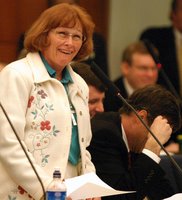By Joannah Nwokeabia and Alex Woolridge
Capital News Service
RICHMOND -- The General Assembly appears likely to pass a cluster of bills aimed at curbing teenage drinking, marijuana use and other ways to get high.
Four bills at various stages of legislative approval call for stricter penalties for underage drinkers or for adults who provide the alcohol. Other bills moving through the General Assembly would punish drivers for using marijuana while operating a vehicle and would ban the sale and use of alcohol vaporizing devices.
All of those bills survived "crossover," the Feb. 14 deadline for legislation to win approval from either the House of Delegates or the Senate. Now they must be passed by the other chamber and signed by Gov. Tim Kaine to become law.
Two proposals -- House Bill 1208, sponsored by Delegate Brian J. Moran, D-Alexandria, and Senate Bill 396, introduced by Sen. Ryan T. McDougle, R-Hanover -- would outlaw serving alcohol in private homes to underage guests who are not accompanied by a parent.
On Friday, the Senate Rehabilitation and Social Services Committee unanimously approved HB 1208; it now goes to the full Senate for a vote. Also last week, the House General Laws Committee unanimously endorsed SB 396; it is being considered by the full House of Delegates.
HB 113, by Delegate David B. Albo, R-Springfield, also would punish Virginians who open their doors to underage drinking. Under this legislation, people who knowingly serve alcohol to underage drinkers would lose their driver's licenses for up to a year. The House passed Albo's bill on Feb. 10, and the Senate unanimously followed suit last week.
Under HB 1210, another measure by Moran, underage drinkers could bid farewell to their driving privileges for at least six months if they are caught buying or possessing an alcoholic beverage. That bill won a unanimous endorsement from the Senate Rehabilitation and Social Services Committee last week.
Drinking isn't the only way to ingest alcohol. SB 100, sponsored by Sen. Harry B. Blevins, R-Chesapeake, would outlaw the use of alcohol-vaporizing devices in Virginia. Such devices disperse hard liquor as vapor, which the operator then inhales. The devices have raised concerns because they cause quicker inebriation by allowing the vapor to enter the lungs and rapidly diffuse through the bloodstream.
In January, the Senate unanimously passed Blevin's proposal. A subcommittee of the House General Laws Committee is now considering the bill.
Another bill moving through the legislative process is HB 1182, sponsored by Delegate Charles W. Carrico Sr., R-Independence. It addresses tetrahydrocannabinol, or THC, the main substance in marijuana. Under Carrico's bill, motorists who have 0.003 milligrams or more of THC per liter of blood would be considered as driving under the influence of drugs. Existing law does not define a specific blood level for THC.
Carrico's legislation, which unanimously passed the House, is pending before the Senate Committee for Courts of Justice.
The progress of such bills has pleased the Washington Regional Alcohol Program, a non-profit group that fights underage drinking, drunken driving and driving under the influence of drugs.
"Now is a good time to assess what survived the Virginia General Assembly's crossover as well as what's in store before this year's session is scheduled to conclude" on March 11, said Kurt Gregory Erickson, the program' president.
"The list of advancing DUI and or teen drinking bills is significant," he said.
For example, he noted, the House has passed:
- HB 1049, sponsored by Delegate John S. Reid, R-Richmond. It would increase the penalty for possessing, manufacturing or selling fake driver's licenses from a Class 2 misdemeanor to a Class 1 misdemeanor. This bill is being considered by the Senate Committee for Courts of Justice.
- House Joint Resolution 35, sponsored by Albo. It would direct Virginia's Crime Commission to study and make recommendations to the current DUI laws. The resolution won approval last week from the Senate Rules Committee.
But Erickson said that several bills supported by his program did not survive crossover and are dead for the session.
Those bills would have banned open alcohol containers in cars, made seatbelt use mandatory for all front-seat passengers, impounded the cars of people caught driving on suspended licenses and increased the penalties for drunken commercial drivers.



